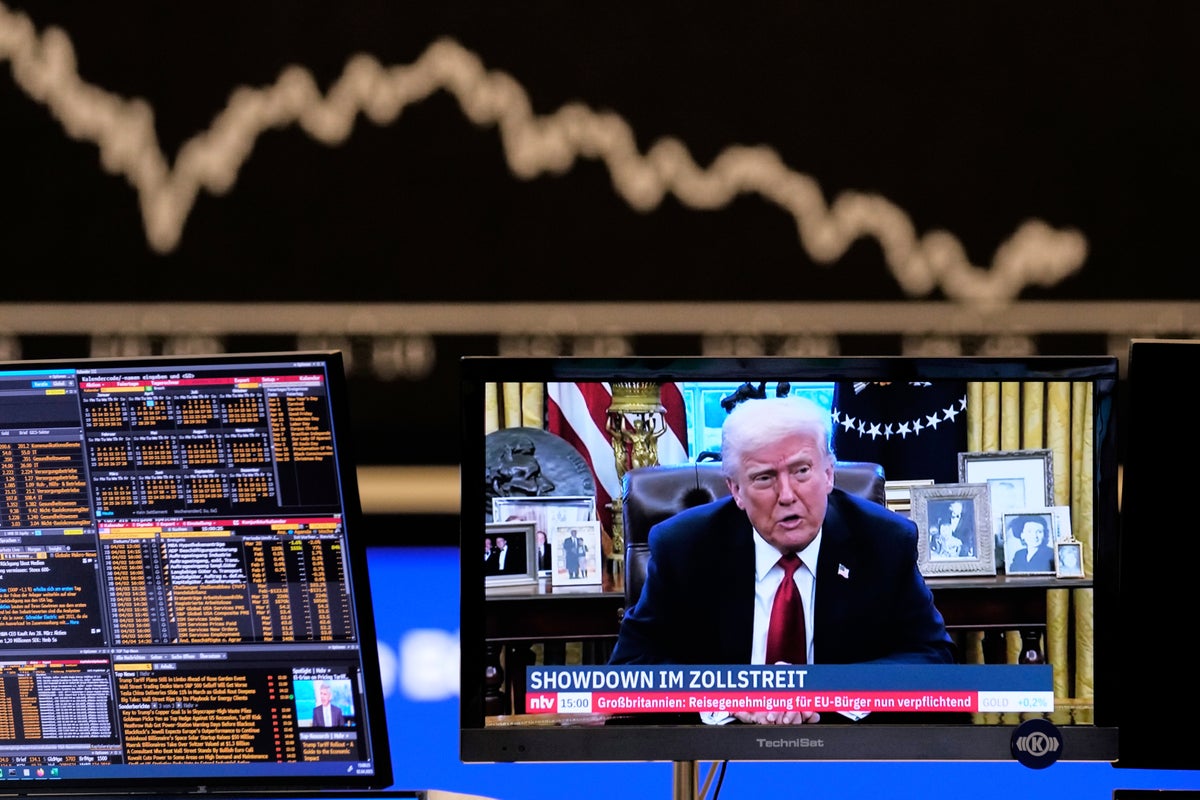
Stock markets across Asia fell on Thursday after US president Donald Trump announced sweeping new tariffs on imports, raising concerns about a potential global trade war and severe economic fallout.
Tokyo’s Nikkei 225 dropped as much as 4 per cent in early trade before partially recovering to close 2.9 per cent lower at 34,675.97 on Thursday. South Korea’s Kospi slipped 1.5 per cent, while Hong Kong’s Hang Seng fell 1.4 per cent.
The Shanghai Composite dipped slightly by less than 0.1 per cent and Australia’s ASX 200 was down 1.3 per cent.
India’s markets also opened lower, with the Sensex falling over 500 points and the Nifty 50 slipping below 23,200 after the US slapped a 26 per cent duty on Indian goods – one of the steepest among Washington’s close trading partners.
“The tariffs are significantly higher than anticipated and will disrupt global trade and, therefore, global growth,” Ankita Pathak, macro strategist and global equities fund advisor at Ionic Asset, told Reuters.
The sell-off came after Mr Trump imposed a 10 per cent baseline tariff on all imports into the US and sharply higher duties on several key countries.
China faces a combined tariff burden of 64 per cent when new and existing measures are counted while Japan has been hit with a 24 per cent duty.
South Korea was levied 25 per cent and the European Union 20 per cent. Taiwan and several Southeast Asian countries, including Vietnam and Bangladesh, are also facing steep new import penalties.
In the US, stock futures plunged following the announcement. S&P 500 futures fell 3.5 per cent, while Dow Jones futures were down 2 per cent.
Currency markets reflected investor unease, with the dollar falling to 148 yen and the Mexican peso also slipping. Gold and Treasury prices rose as traders moved towards safer assets.
The new tariffs, unveiled by Mr Trump on what he dubbed “Liberation Day”, represent a dramatic escalation of his long-standing push to reshape the global trade system, prompting fears of a trade war and a global economic fallout.
“This was the worst-case scenario that the market was expecting,” Jay Hatfield, CEO of Infrastructure Capital Advisors, told Reuters. “It’s enough to potentially send the US into a recession, and that’s why the futures are so weak.”
Speaking from the White House Rose Garden, Mr Trump argued that the measures were about fairness, calling them “reciprocal” tariffs designed to match or counter the duties other countries place on US goods.
“In many cases, the friend is worse than the foe in terms of trade,” Mr Trump said.
The US president had earlier imposed 25 per cent tariffs on car imports and expanded duties on steel, aluminium and a range of other goods like pharmaceuticals, chips, lumber and copper.
But Wednesday’s announcement goes further, effectively erecting new barriers around the world’s largest consumer market.
“These figures aligned more closely with aggressive tariff scenarios, putting pressure on risk assets,” said Uto Shinohara, senior strategist at Mesirow Currency Management.
The tariff hikes are likely to hit global supply chains, particularly in sectors like electronics and automobiles, where manufacturing is spread across multiple countries.
Analysts warn that trading partners are likely to respond with their own countermeasures, raising the risk of higher consumer prices and supply disruptions.
While some investors initially focused on the 10 per cent headline rate, which was lower than expected, the higher country-specific tariffs triggered fresh anxiety.
“We’ve just got one side of the story, what the US is doing,” said Walter Todd, CIO at Greenwood Capital. “The other side is how other countries respond.”
In Asia, the impact could be compounded by the fact that many of the affected countries are deeply integrated into the global manufacturing ecosystem.
Companies that had shifted production from China to neighbours like Vietnam and Bangladesh to avoid previous tariffs may now find themselves in the crossfire again.
The tariff policy also weighed on energy and commodity prices. US benchmark crude dropped $2.08 to $69.63 per barrel, while Brent crude fell to $72.89.
Mr Trump’s announcement marks a sharp reversal of decades of trade liberalisation that followed the Second World War. Some analysts believe it could reshape global commerce if the duties become entrenched. Others say the move may be intended as a negotiating tactic, though uncertainty over future policy is already weighing on business decisions.
“We’re in the early innings of what could unfortunately turn into a very serious global trade war,” Don Calcagni, CIO at Mercer Advisors told Reuters.
Source: independent.co.uk


